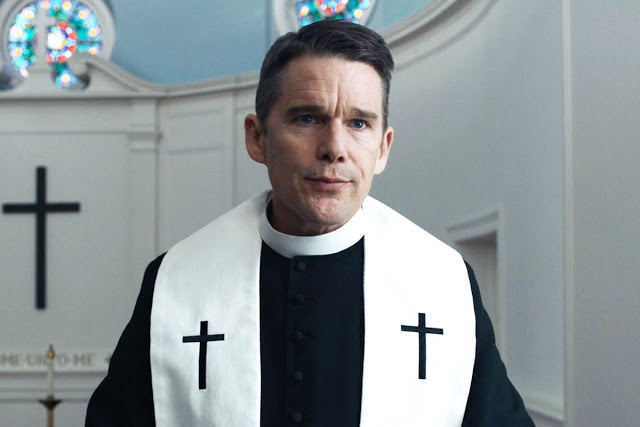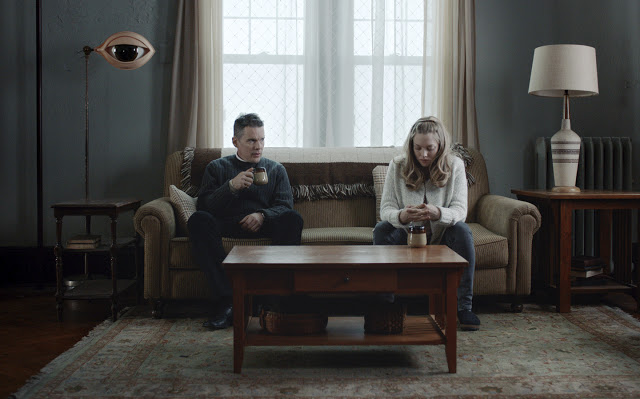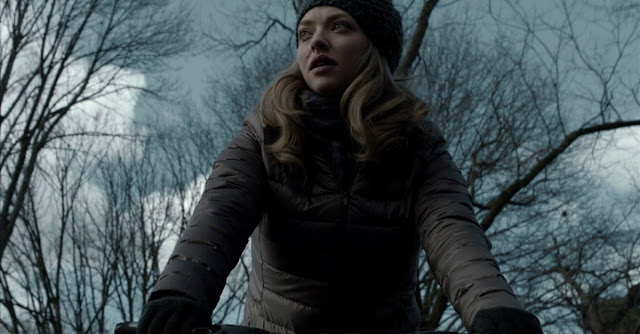Ethan Hawke has always had a crease in his face, a thin vertical line running from the center of his forehead to the bridge of his nose. But this crinkle somehow looks more pronounced in First Reformed, as though the weight of the world has been pushing in on his features and flattening the surrounding skin. Hawke is a naturally garrulous presence—recall his motormouthed writer of Richard Linklater’s Before movies, as well as his cool dad of Boyhood—which makes him a curious choice to play Reverend Toller, a solitary preacher haunted by internal demons. But just as Hawke’s career has slowly illuminated the considerable talent behind the folksy Texas charm (he’s recently done some of his best work in low-profile films like Predestination and 10,000 Saints), First Reformed gradually reveals itself as a different creature, a more subtle beast, than it first appears. What starts as a sober character study eventually transforms, almost miraculously, into… something else.
To say too much would risk spoiling the story’s surprises, but it’s important to note that the story is surprising, and that it smartly leverages our expectations against us. As you settle in to First Reformed and absorb its particular aesthetic and narrative qualities—its cramped aspect ratio, its grey palette, its solemn and solitary voiceover—you are likely to deduce that the movie will unfold as an attentive but familiar exploration of its complicated, grief-stricken hero. Your assumption will not be entirely wrong; to the last, First Reformed commits completely to its mission of understanding what makes Reverend Toller tick. But Paul Schrader, the iconoclast who wrote and directed this movie and whose name will be forever linked with his script for Taxi Driver, is not interested in making a gentle prestige picture. He goes for the throat as well as the soul.
Not that he’s in any rush about it. From its opening shot, where the dawn light slowly leaks into the frame to reveal a steepled church sitting on a hill, First Reformed moves deliberately. This makes the film’s first act a bit sluggish, though the leisurely pace does tap into its protagonist’s gnawing ennui. Toller is the preacher of that hilltop sanctuary, yet he finds himself less the leader of a house of worship than the figurehead of a historical landmark. Nestled in an unremarkable neighborhood outside of Albany, the First Reformed Church is nearing its 250th anniversary, for which Abundant Life—a sprawling network of faith-based services that operates as First Reformed’s commercial benefactor—has planned a massive reconsecration ceremony. And so while Toller may be close to God, he spends more time hawking tacky wares in the gift shop than delivering sermons from the pulpit. As someone brusquely tells him, “You’re the minister of a tourist church no one attends.”
One parishioner who does attend is Mary (Amanda Seyfried), who pleads with Toller to give philosophical advice to her husband, Michael (Philip Ettinger), a recently released convict suffering from depression. (When Toller mildly inquires if Mary had considered going to Abundant Life for help, she cuts him off, saying that Michael deems it to be an inhuman corporation.) In the movie’s first set piece, which Schrader stages with unfussy steadiness, Toller visits Mary and Michael’s home and engages with Michael in a lengthy debate that is somehow both combative and respectful. Michael is an environmental activist, and he asks pointedly how he and the pregnant Mary can consider bringing a child into a planet that, according to all reliable scientific evidence, is fated for devastation. In response, Toller doesn’t so much question Michael’s assumptions—he in fact agrees that Man is mangling God’s glorious creation—as challenge his despair. There’s empathy in his voice, as well as stimulation; some people might resent their entire worldview being attacked by a person they’ve just met, but for our intellectual reverend, “It was exhilarating.”
That may be a stretch, but it is certainly intriguing to see two adults participate in earnest discourse that’s tinged with ecological and spiritual implications, and it is always satisfying to watch Hawke work. His nuanced performance amplifies one of First Reformed’s sharpest decisions: It paints Toller as neither a zealot nor an apostate. He is instead a devoted Christian who nevertheless recognizes his religion’s complexities and contradictions. And the crisis that he inevitably suffers is not so much one of faith as one of condescension.
The more Toller interacts with people, the more despondent he becomes about their selfishness, their inability to comprehend God’s true nature. (I’m reminded of the famous exchange in Broadcast News, when Holly Hunter’s boss seethes, “It must be nice to always believe you know better, to always think you’re the smartest person in the room,” and she replies with perfect sincerity, “No, it’s awful!”) He has regular meetings with Pastor Jeffers (Cedric the Entertainer, entirely restrained), Abundant Life’s de facto CEO, and while their rapport is initially cordial, it gradually disintegrates into mutual animosity; Toller is convinced that Jeffers is more bureaucrat than cleric, while Jeffers is exasperated that Toller refuses to recognize the pragmatic realities of running a church in modern society. Even more vexing to Toller is Esther (Victoria Hill), a former lover who begs him to take care of himself—he’s suffering from stomach cancer, which he treats with cocktails of bourbon and Pepto Bismol—and whose entreaties strike him as weak and pitiful. “I despise you,” he hisses at her, a brutal remark that reveals his capacity for cruelty as well as decency.
The one person whom Toller seems to genuinely respect is Mary, and as the relationship between the shepherd and the lamb intensifies, First Reformed similarly undergoes a shift in tone and style. For much of the film, Schrader’s technique is predictably austere; his frames are thoughtfully composed, but his approach to the dialogue-driven scenes is mostly point-and-shoot. But as Toller’s physical and existential plight grows more dire (not unlike Travis Bickle’s), Schrader’s method becomes increasingly baroque, with heightened sound and color. This flamboyance culminates in a stunning fantasy-nightmare sequence that’s part Terrence Malick, part David Lynch, reveling in the wonder and terror of the world.
It’s a rather extraordinary gearshift, one that functions to reverse the movie’s strange polarities. The first half of First Reformed is intelligent and scrupulous, but it’s probably more interesting to think about than it is to watch. (For an even more sedate study of rattled faith, see Scorsese’s Silence, though honestly, don’t.) Yet for the latter half, the opposite is true. That fantasy sequence is dazzling, but its broader meaning eludes me. And while the film’s ambiguous ending seems designed to invite fervent audience speculation—what did she say? what happened? was that real?—it’s a bit too outlandish to trouble my dreams. Still, it’s impossible to deny the dramatic momentum that First Reformed accumulates, and the operatic force of Schrader’s execution. If that sounds hard to explain, just know that the movie works in mysterious ways.
Jeremy Beck is the editor-in-chief of MovieManifesto. He watches more movies and television than he probably should.




